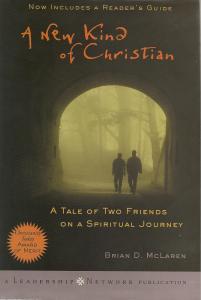We may be able to squeak by with a little bit of prayer here and there, but thriving as growing Christians has everything to do with our connection to Christ…And that's fairly representative of his approach. You don't get the impression he's bashing the pulpit as he speaks, more chatting life through. I've not read Coffeehouse Theology (another of his books), but that's sort of the level this feels like.
There are certainly some who would disagree with some of Ed's conclusions (though is that so bad?), but it feels like these are things he's wrestled with, not just rifled through the possibilities and picked the answer he most likes.
Personally, I really like his approach, and have a chuckle at passages like this:
I suddenly felt silly for fighting evolution for so many years. I was especially annoyed that my Truth fish (the one that’s eating a Darwin fish with legs) damaged the paint job on my car when I peeled it off.But equally, I imagine that there are some who might argue that he needs to take his subject matter more seriously (though there's arguably enough 'serious' stuff out there to sink a fleet of ships…).
Ed also jostles some of our foundations. He questions whether we have built our faith on the right foundations. So, in his chapter on the Bible, he poses this:
The question for us today isn’t “Am I doing the Bible right?” The question is this: “Am I living like Jesus?”Where should our reliance be? Must we trust completely in an eternal-fires-of-hell approach to eternity? Because if that's ever undermined, our faith may struggle. Must we believe in literal interpretation of scripture (e.g., six days (24 hour periods) of creation) at every turn? Because if that's ever undermined, our faith may falter. Of course, such challenges may leave some feeling uncomfortable. And some may feel that altering some of our foundations is more of a 'Christian Cop-out Guide' than a 'Christian Survival Guide', but I'm inclined to think that Ed makes some useful, challenging points (even if I wouldn't necessarily agree with everything he's written…)
This is also a personal book. It's not just a dry run through of the theory, but wisdom gleaned from experience. For that reason, it feels a bit more believable than it otherwise might. Ed doesn't play his cards close to his chest in this book. He's willing to be open about his own struggles and journey. Here's something he says about money:
I’ve had to confess that I sometimes crave financial stability more than I crave spiritual stability.The book seems to be written for a primarily American audience, so there will be some things that don't quite ring true if you're reading it elsewhere, but the general gist still holds firm, and minor content-related discrepancies can generally be readily applied within a different framework.
As a summary, I'd recommend the book. Ed's got a sensible, pastoral approach that encourages self-examination and a willingness to question ones own ideas and priorities.
I received a free copy of this book (not a paper copy, which both saddens me and relieves my bookcase) for review. No threats were made concerning the nature of my review, and I feel completely free to review the book in whatever way I see fit. (I know that's not the legal American wording for reviews, but I'm not American…)
Here are the chapter headings, for those who can't find them elsewhere. Oh, and it's Ed Cyzewski, if you're wondering.
Part 1: Christian Beliefs
- Prayer: A Still Small Voice for Big Loud Problems •
- The Bible: A Source of Crisis and Hope •
- Violent Bible Stories: Deliver Us from God? •
- Deliver Us from Evil: Is God Late? •
- Hell: Getting Our Goats . . . and Sheep •
- Errors in the Bible?: Fact-Checking the Holy Spirit •
- The Bible and Culture: Less Lobster, More Bonnets •
- No Doubt? Are Christians Beyond a Doubt? •
- Apocalypse Now? Yay! It’s the End of the World! •
- Sin Addiction: The Freedom of Restraint •
- Money: Give Everything Away and Then Tithe 10 Percent to Je$u$ •
- Community: When Bad Churches Happen to Good People •
- Not Ashamed of the Gospel? Death of a Sales Pitch •
- The Holy Spirit: Flames of Tongue-Tied Fire •








